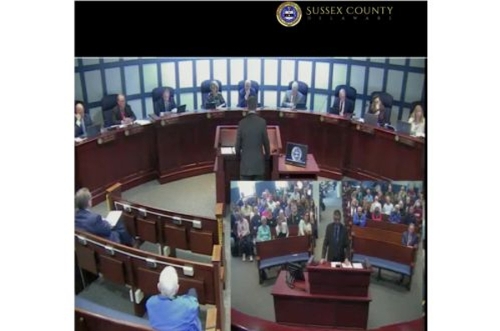
Sussex Co. Council Stops Offshore Wind Cables
DNREC's $2 Million Deal and Environmental Concerns Spark Public Outcry
By David T. Stevenson
Center for Energy & Environmental Policy
December 18, 2024 (updated 12/19/2024)
(Pictured: Screenshot of the livestream from the Sussex Council Meeting)
On December 17th, four of five members of the Sussex County Council voted to deny the conditional use permit, putting the brakes on the offshore wind project and delivering an early Christmas present to the citizens of Sussex County! This decision comes after widespread public concern, federal agency warnings, and a controversial approval process led by the Delaware Department of Natural Resources & Environmental Control (DNREC).
To understand the full scope of this decision, it's important to look back at DNREC's role and the federal concerns that were dismissed.
DNREC Approves Permits Despite Federal Warnings
DNREC issued permits to US Wind for the Maryland Offshore Wind Project, allowing four offshore wind power cables to pass through Delaware's Indian River Bay. This decision comes despite federal agency warnings to use land-based routes instead. DNREC is allowing the destruction of the bay's environment for a paltry $2 million a year for twenty years.
Federal Agencies Sound the Alarm
First among the federal concerns, the National Marine Fisheries Service, a federal agency responsible for marine conservation, commented on the US Wind project:
"Given the significance of both inshore and offshore habitats to the ecology of the area, and because these sensitive habitats cannot be easily replaced when degraded by construction activity, we suggest that terrestrial cables be used."
(Note: terrestrial cables are land-based rather than underwater, reducing risks to sensitive marine habitats.)
Adding to these concerns, the US Environmental Protection Agency made a similar recommendation. US Wind offered options to run cables on land either north or south of the bay to an electric substation near Dagsboro, and it has received federal approval to do so. We can assume US Wind prefers the bay option to save money.
DNREC Ignores Warnings and Accepts Payments
Contrary to federal recommendations, DNREC has ignored the advice and has approved the project despite having no way to fix the potential negative construction impacts of the project once they occur, but is taking $62 million in payments over 20 years to measure the damage and to try to compensate injured parties. That is $40 million in current dollars, or $2 million annually.
Of that money:
- Almost all the money goes to DNREC for various uses,
- Only $750,000 goes to commercial fishermen for potential lost revenue and a lost way of life.
Federal Environmental Impact Statement: Major Risks
The federal Final Environmental Impact Statement states that wind turbines just 10 miles off the coast will have a major negative impact by dominating the horizon.
DNREC tries to ignore the fact that allowing the power to come ashore will result in the construction of the turbines. DNREC is not requiring a Coastal Zone Act permit even though the stated purpose of the Act is to protect coastal tourism and recreation.
According to federal environmental impact studies, US Wind's proposed turbines will have a major negative impact and will:
1.) Dominate the entire shoreline view in Delaware and Maryland leading to lost tourism and lower property values.
2.) Harass marine life with noise from construction and operations, risking the extinction of whales and other endangered species.
3.) Interfere with radar systems, risking vessel collisions, disrupting Coast Guard operations, and reducing military security.
4.) Drive commercial fishermen to abandon fishing in lease areas.
5.) Compromise the fragile Indian River and Bay.
All twenty years of the US Wind funding, including additional funds promised to the state and beach towns for not opposing the project, would be wiped out by a 3% loss in tourism in just one year.
Sussex County Steps In: Conditional Use Permit Denied
This project required a Sussex County Conditional Use permit to build an electric substation as the destination for these cables. The County defines a conditional use must promote the health, safety, morals, convenience, order, prosperity, and welfare of the present and future inhabitants of Sussex County, and the conditional use must be for the general convenience and welfare of the inhabitants of Sussex County.
As discussed in detail in numerous public comments on July 30th, the conditional use permit did not meet these standards.
On December 17th, four of five members of the Sussex County Council voted to deny the conditional use, halting the offshore wind project and protecting the environmental and economic well-being of Sussex County.